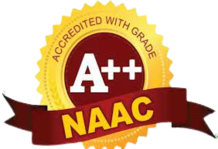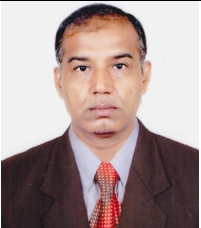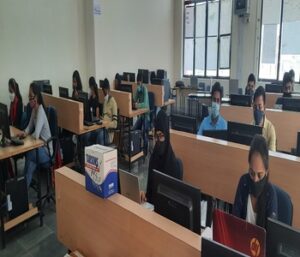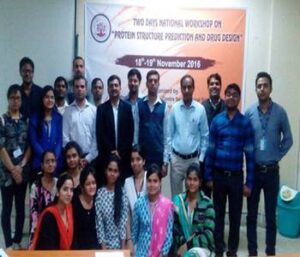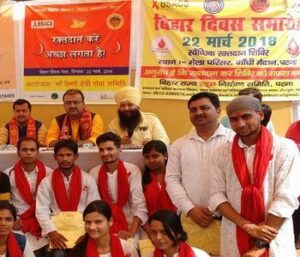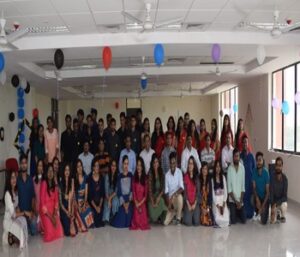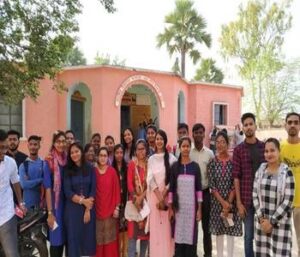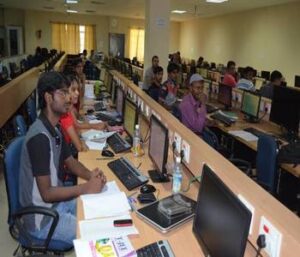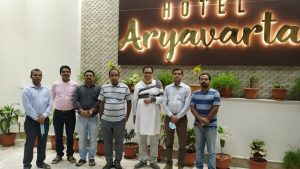






Bioinformatics is a rapidly growing interdisciplinary field of study, involving multiple disciplines of biology, chemistry, physics, mathematics, statistics, pharmaceutical & computer sciences, and information technology. It has wide-ranging applications from marker development and diagnostics to drug discovery and toxicological predictions. To mention few, modeling, simulation and AI techniques, drug lead predictions and optimization, are the most sought-after skills for job-seekers in pharmaceutical and biomedical industries.
With a purpose to open a new department in this frontier area, the foundation of the department was laid in 2011 and for a while it continued as an independent Bioinformatics Programme within the-then Centre for Biological Sciences. In 2018, it acquired full-fledged department status. It is the only department in the entire state of Bihar, and one of the few places of higher learning in Eastern India to promote teaching and research in Bioinformatics & computational sciences.
The department offers two programs: (i) MSc in Bioinformatics, and (ii) PhD in Bioinformatics. In these programmes, the students are trained for various scientific methods and tools, enabling them to better suit for different research laboratories and industries, which require manpower skilled in programming languages, data analytics, machine learning techniques, computational modeling and drug design. Students are provided support and encouragement to gain experience in the department, as well as in established labs in the country, for their project work and to publish their research.
Department Overview
|
Established in |
2011 |
|
Employee Strength |
Faculty- 07 |
|
Student Strength |
Research Scholar & JRF-19 |
|
Placement 2022 |
10 (tentative) |
|
Publications & Patent |
Publications- 101 |
News and Announcements
Important Links
-
Formats & Downloads
-
Archive
Board of Studies (BoS)
BoS is a statutory body for each department/centre, primarily responsible for syllabus design and regular update. As described in the Ordinance section 25.10,
The functions of the Board of Studies shall be:-- To recommend to the School Board, courses of studies offered by the Department/Centre and continue updating syllabus;
- To take all steps in accordance with the provisions of the Regulations about teaching and evaluation of various courses/programmes of the Department/Centre;
- To recommend to the School Board measures for the improvement of teaching and research in the Department/Centre;
- To constitute panels of experts to be considered for appointment as Examiners, Board of Examiners for various courses/academic programmes and M.Phil./Ph.D. thesis representing various specializations of Departments/Centres; and
- To perform such other functions as may be assigned to it by the School Board, the Academic Council, the Executive Council and the Vice-Chancellor.
Department Committee (DC)
As enshrined in the Ordinace-26, the Department/Centre Committee (DC/CC) shall consist of the Head of the Department/Centre, as Chairperson ex-officio, and all faculty members of the Department/Centre.
26.2 The Department/Centre Committee shall have the following functions, namely–- To make proposals to the Board of Studies on academic programmes concerning teaching and research, and the creation, specialization and abolition of teaching posts;
- To propose schemes for the maintenance and improvement of the standards of various programmes of study and research of the Department/Centre;
- To apportion the teaching and co-curricular work of the Department/Centre among the teachers thereof and monitor the proper execution thereof;
- To consider and decide on the assignment and utilisation of the space, equipment and other assets of the Department/Centre and other matters of general and academic interest of the Department/Centre;
- To consider and recommend perspectives and major thrust areas for research and to propose research projects to be taken up by the members of the Department/Centre, individually/collectively;
- To review and apprise the SRC/URC with the current status of research in Department/Centre;
- To suggest to SRC/URC norms related to qualifications and research experience of a faculty to be recognized as a research degree supervisor and to constitute Department/Centre Research Degree Committee (DRC/CRC);
- To suggest to University Admission, Teaching and Evaluation Committee (UATEC) on any issue related to admission, teaching, continuous evaluation in courses and students’ assessment of courses, offered by the Department/Centre to improve quality of education.
- To constitute such Committee(s) comprising members of the Department/Centre, and if necessary external experts, for framing and implementation of rules and regulations related to admission, teaching, continuous evaluation, maintenance of students’ records including alumni affairs as well as promotion of research and development; and
- To perform such other functions as may be assigned by the Ordinances or Regulations, or by the Vice- Chancellor/Dean/School Board from time to time.
Department Research Degree Committee (DRDC)
Departmental/Centre Research Degree Committee (DRDC/CRDC) deal with all matters connected with the Ph.D. Programme of the Department and report the matter to the University Research Degree Committee (URDC), as per University Ordinance-33. It consists of the Head of Department/Centre as Chairman and other faculties in the department.
Functions of DRDC/CRDC are as follows:- Allotment of Supervisor, Co-Supervisor, recording reasons for not admitting a candidate.
- Recommendation for extension of time for submission of thesis
- Recommendation to peruse a part of research outside the University
- Approval of the Course Work
- Assessment and Grading in Course Work
- Monitoring the research progress of the candidate
- Approval of Research plan proposal/language
- Sanction of duty leave to the Ph.D. candidate
- Assessment of Ph.D. work through pre-submission seminar
- Maintaining the record of research paper publications of the candidate
- 11 Recommendation of panel of experts for thesis evaluation
- Assessment of revised thesis for satisfactory compliance, if any
- Arrangement of Viva-voce in the absence of the supervisor
- Recommendation to waive the Viva-voce
Research Advisory Committee (RAC)
A Research Advisory Committee (RAC) is constituted for every research scholar admitted in PhD programme. The Committee would guide the research scholar to develop the study design and methodology of research and to To periodically review and assist in the progress of the research work of the research scholar. The committee shall have also have power to recommend the co-supervisor and cancellation of registration
Vision |
|
Mission |
|
- Objectives of the Program: The core objective of the programme is to provide quality education to the graduates, who want to pursue their career in the emerging areas of Bioinformatics and Computational Biology.
- To serve as a nodal point for Bioinformatics and its applications
- To provide industry interface to the students for research project
- To build skilled manpower for drug design and pharmaceutical industry
- Program Outcomes: At the end of training, students should:
- have a understanding of scientific methods, techniques and tools and their applications in Bioinformatics and computational sciences
- be skilled in data generation, analysis and management and be able to apply the knowledge for scientific enquiry
- have gained oral presentation and scientific writing skills.
- Eligibility: Bachelor's degree in Biological Sciences / Agricultural Science / Pharmaceutical Science/Veterinary Science/Medical Science / Mathematics/ Physics/Chemistry /Computer Science/Information Technology or Integrated B.Sc. B.Ed. with 55% marks for General/OBC candidates and 50% marks for SC/ST candidates from any recognised University.
- Intake: 45
- Objectives of the Program:
- To prepare outstanding & skilled computational scientist and professionals, who could effectively translate their skills in bio, pharma and healthcare sectors, and serve in academia to provide quality training and research.
- Program Outcomes: At the end of training, students should:
- have a comprehensive understanding of scientific methods and techniques, and their application in Bioinformatics and computational sciences;
- be able to demonstrate originality in their approach in dealing with scientific problems in computational areas;
- be skilled in knowledge creation, management and application, and in the planning and implementation of research
- should be able to critically examine research findings and methodologies
- have gained oral presentation and scientific writing skills.
- Eligibility: Master's Degree from any recognised University in Biological Sciences/Agricultural Science/Pharmaceutical Science/Veterinary Science/Medical Science/Physical Science/Chemical Science/Computer Science/IT with 55% in aggregate or its equivalent Grade B in UGC 7 point scale. A Relaxation of 5% of marks from 55 to 50% or equivalent relaxation of Grade for SC/ST/OBC (Non creamy layer)/Differently abled candidates. Candidates having Master Degree in any of the above discipline with specialisation in Bioinformatics or having Master's Degree in Bio-Informatics will be given preference.
- Intake: Subject to availability of seats as notified


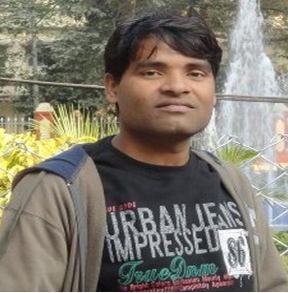

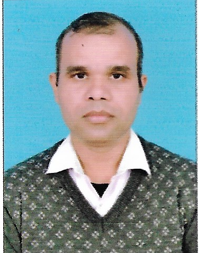

-
- Lab facility
Extensive infrastructure facilities have been developed for rigorous training and to carry out research activities. The computer labs have are equipped with latest computers of high configuration having intel i7 multi-core processors. All computers are connected with high band-width internet connection powered by 1 GBPS National Knowledge Network (NKN) of Government of India. These labs have several HP, Dell, Fujitsu & Tyrone workstations and servers for high performance computing.
-
- List of instruments& Softwares in the Lab
- Multiple HP and Dell workstations and servers
- 26-intel i7 desktop computers
- Accelrys, Schrodinger, AMBER & various open source/commercial softwares
- Lab staffs and their contact
- Priyatam Manohar Mrinal – Laboratory Attendant
Qualification: B.Sc.( Zoology)
Email: priyatammrinal@cub.ac.in
Contact: 0631-2229- - Atul Kumar Tripathi – Laboratory Attendant
Qualification: M.Sc.
Email: atulkumar@cub.ac.in
Contact: 0631-2229-
- Priyatam Manohar Mrinal – Laboratory Attendant
- List of instruments& Softwares in the Lab
| S.No. | Year | Session | Enrollment no | Name | CGPA |
|---|---|---|---|---|---|
| 1 | 2021 | 2019-21 | CUSB1903312016 | Nikita Krishna | 8.67 |
| 2 | 2020 | 2018-20 | CUSB1803312018 | Sanjay Kumar Mohanty | 9.54 |
| 3 | 2019 | 2017-19 | CUSB1703122009 | Kriti Kumari | 8.00 |
| 4 | 2018 | 2016-18 | CUSB1603122008 | Prasun Kumar Dev | 8.19 |
| 5 | 2017 | 2015-17 | CUSB1403122008 | Priyanka Rani | 8.17 |
| 6 | 2016 | 2014-16 | CUSB1403122021 | Shweta Kumari | 9.00 |
| 7 | 2015 | 2013-15 | CUSB13312016 | ||
| 8 | 2014 | 2012-14 | CUSB1203312016 |
| S.No. | Research Scholar/JRF/Project staff | Photograph | Guide | Academic Qualification | Research Area | Achievement/Award /Publication |
|---|---|---|---|---|---|---|
| 1 | Rakesh Kumar rakeshbis@cub.ac.in CUSB1503175001 Contact:7870783312 |
 |
Dr. Vijay Kr. Singh | M.Phil. in Bioinformatics | Functional Genomics & microarray/NGS data analysis Molecular Modelling, Drug Discovery & Molecular Dynamic Simulation |
Publications including conference Publications :
|
| 2 | Sonu Kumar CUSB1503175002 sonukumar@cub.ac.in Contact: +919835431433 |
 |
Dr. Asheesh Shanker | M.Phil. in Bioinformatics | Bioinformatics & Genomics | Publications
|
| 3 | Agnik Haldar halderagnik@gmail.com agnikhaldar@cusb.ac.in CUSB1803375001 |
 |
Dr. Ajay Kumar Singh | M.Tech. Bioinformatics | Functional Genomics, Transcriptomics, Statistical NGS Data Analysis, Cancer informatics | Publications
|
| 4 | Bikash Kumar rajak bikash@cusb.ac.in bkrbikash0@gmail.com CUSB1803375001 |
 |
Dr. Durg Vijay Singh | B.Sc. Botany Hons. M.Sc. Bioinformatics |
Molecular Dynamics Simulation and Computer-aided Drug Discovery | Publication/conference
|
| 5 | Keerti Kumar yadav keerti@cusb.ac.in 7836071067 |
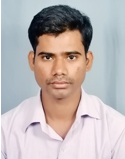 |
Dr. Ajay Kumar Singh | M.Tech Bioinformatics | Systems Biology,Cancer informatics, CADD |
|
| 6 | Kiran Kr A kirankumar@cusb.ac.in |
 |
Prof. R.S Rathore | M.Sc.Biochemistry | Molecular Modeling & Drug Design | GATE Qualified. Publications including conference Publications:
|
| 7 | Praffulla Kumar Arya CUSB1803375005 praffullaarya@cusb.ac.in Mobile: 7979031632 |
 |
Dr. Anil Kumar | M.Sc. Bioinformatics | Biological Database Development | Chapter Publications
|
| 8 | Kriti Kumari kriti@cusb.ac.in |
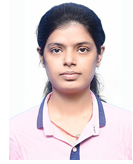 |
Dr. Asheesh Shanker | M.Sc Bioinformatics | Evolutionary biology and computer-aided drug discovery |
|
| 9 | Pranabesh Mandal pranabesh@cusb.ac.in Mobile: 7908836982 |
 |
Dr. Durg Vijay Singh | M.Sc. Bioinformatics | Molecular Dynamics Simulation and Computer-aided Drug Discovery | Awards received: -Best Poster Presentation Award-
|
| 10 | Priyanka rani priyanka.rani.453@gmail.com priyanka@cusb.ac.in |
 |
Dr. Durg Vijay Singh | B.Sc. Industrial microbiology (2015) M.Sc. Bioinformatics (2017) |
Structural biology, Molecular modelling, Molecular docking, Dynamics study, Computer Aided-Drug discovery Microbiology |
Published research articles:
-Oral Presentation- -Best Poster Presentation Award- |
| 11 | SM Shayez karim |  |
Prof. R.S Rathore | M.Tech Bioinformatics | Brain Connectome Analysis | |
| 12 | Suchitra Singh suchitrasingh@cusb.ac.in CUSB1903375006 |
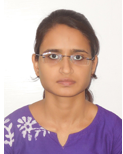 |
Dr.Ajay Kumar Singh | M.Sc Bioinformatics | Molecular modelling and Drug Design | Publications and Conferences
|
| 13 | Sumanta kumar Sahu sumanta@cusb.ac.in Mob:9937209313 |
 |
Dr. Krishna Kumar Ojha | M.Sc. Bioinformatics | Rational Drug Design & QSAR | |
| 14 | Gyan Prakash Rai Email: gyanprakash@cusb.ac.in Mob:8860759395 |
 |
Dr. Asheesh Shanker | M.Sc. Bioinformatics | ||
| 15 | Mayank Kumar Email mayank2801@gmail.com Contact 9308953868 |
 |
Prof. R.S. Rathore | Master in Computer Application | Protein Structure Prediction | UGC - NET (June 2020 ) Qualified |
| 16 | Kirshnendu Krishnendubarik@gmail.com 7008641931 |
 |
Dr Anil kumar | MSc Bioinformatics | Biological Database Development | |
| 17 | Niharika niharika@cusb.ac.in 8228934884 |
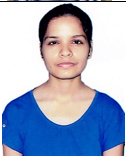 |
Dr.Vijay Kumar Singh | MSc. Bioinformatics | Transcriptomics | |
| 18 | Piyush kumarpiyush285@gmail.com CUSB2003375005 |
 |
Dr. Ajay Kumar Singh | M.tech Bioinformatics | Drug Discovery | Oral Presentation
|
MSc (2021-23) Batch
|
r. No. |
Enrolment_No |
NAME OF THE APPLICANT |
|
|
1 |
CUSB2103312001 |
ABHISHEK CHOUDHARY |
|
|
2 |
CUSB2103312002 |
ABHISHEK KUMAR |
|
|
3 |
CUSB2103312003 |
AFSA NAAZ |
|
|
4 |
CUSB2103312004 |
ANIRUDDHYA MUKHERJEE |
|
|
5 |
CUSB2103312005 |
ANKITA SUBHADARSANI PARIDA |
|
|
6 |
CUSB2103312006 |
ANMOL SHARMA |
|
|
7 |
CUSB2103312007 |
ANSHUL VERMA |
|
|
8 |
CUSB2103312008 |
FIZZA KHAN |
|
|
9 |
CUSB2103312009 |
HARSH KUMAR |
|
|
10 |
CUSB2103312010 |
HASEEB AHMAD |
|
|
11 |
CUSB2103312011 |
JAGRITI SHUKLA |
|
|
12 |
CUSB2103312012 |
JYOTI MURMU |
|
|
13 |
CUSB2103312013 |
KOPAL SINGH |
|
|
14 |
CUSB2103312014 |
KRUTIDEEPA ROUT |
|
|
15 |
CUSB2103312015 |
NEHA KUMARI |
|
|
16 |
CUSB2103312016 |
NISHANT RAJ |
|
|
17 |
CUSB2103312017 |
PALLAVI SINGH |
|
|
18 |
CUSB2103312018 |
PRABIR BARMAN |
|
|
19 |
CUSB2103312019 |
RAVI SHANKAR SHARMA |
|
|
20 |
CUSB2103312020 |
REDAM SAHA |
|
|
21 |
CUSB2103312021 |
RITIKA SINGH |
|
|
22 |
CUSB2103312022 |
SAFEER KHAN |
|
|
23 |
CUSB2103312023 |
SAURAV KUMAR |
|
|
24 |
CUSB2103312024 |
SHREYA BHARDVAJ |
|
|
25 |
CUSB2103312025 |
SONALI SINHA |
|
|
26 |
CUSB2103312026 |
SREESHMA RAJ K |
|
|
27 |
CUSB2103312027 |
SUBHASHREE SAHU |
|
|
28 |
CUSB2103312028 |
SUGAM KUMAR PATEL |
|
|
29 |
CUSB2103312029 |
SUMAIYA KHATUN |
|
|
30 |
CUSB2103312030 |
SUMAN KUMARI |
|
|
31 |
CUSB2103312031 |
SUSHREE ADARSHEE SAHU |
|
|
32 |
CUSB2103312032 |
SWETA |
|
|
33 |
CUSB2103312033 |
YUKTI SINGH |
|
|
MSc(2020-22) |
Batch |
|
|
|
Enrolment No. |
Name of Student |
E-mail of student(personal) |
|
1 |
CUSB2003312001 |
ANANYA KASHYAP |
kashyapananya46@gmail.com |
|
2 |
CUSB2003312002 |
ANNAPURNA KUMARI |
annapurnakumari945@gmail.com |
|
3 |
CUSB2003312003 |
ANWESHA DHAL SAMANTA |
dhalanwesha9@gmail.com |
|
4 |
CUSB2003312004 |
ASHISH PRATIM MAHANTA |
ashishpratim@gmail.com |
|
5 |
CUSB2003312005 |
ATUL ABHISHEK |
atulabhishek2010@gmail.com |
|
6 |
CUSB2003312006 |
GARIMA KUMARI |
kgarima147@gmail.com |
|
7 |
CUSB2003312007 |
GAURAV KUMAR |
gauravguptasatsa@gmail.com |
|
8 |
CUSB2003312008 |
H KIRAN |
kiranrekhahari@gmail.com |
|
9 |
CUSB2003312009 |
KISHAN KUMAR |
kkishan593@gmail.com |
|
10 |
CUSB2003312010 |
MADHVI KUMARI SINHA |
madhukrsinha31@gmail.com |
|
11 |
CUSB2003312011 |
MANAVI KUMARI |
manavikumari9@gmail.com |
|
12 |
CUSB2003312012 |
MANISHA MOHANTA |
munnamohanta71686@gmail.com |
|
13 |
CUSB2003312013 |
NISHANT SHEKHAR |
nishant.shekhar776@gmail.com |
|
14 |
CUSB2003312014 |
POOJA KUMARI |
pkri7225@gmail.com |
|
15 |
CUSB2003312015 |
PRIYANSU BEHERA |
pbpriyansu@gmail.com |
|
16 |
CUSB2003312017 |
RAJESH MISHRA |
shakhtlaunda1509@gmail.com |
|
17 |
CUSB2003312018 |
SHRABANTI ACHARYA |
aloke.kumar28@gmail.com |
|
18 |
CUSB2003312023 |
TRISHULA MITRA |
trishulamitra@gmail.com |
|
19 |
CUSB2003312026 |
Rashmi Kumari |
rashmikri1819@gmail.com |
- Project
- Dr. Durg Vijay Singh PI, UGC (2013-15; 6 lacs) project entitled Design and development of inhibitors against Nucleotide Binding Domain of P-gp for enhancing Bioavailability and reversal of multidrug resistance
- Dr. Durg Vijay Singh, PI, DST Kiran (2014-15; 3.26 lacs) project entitled Design and Development of herbicide against carboxyl-terminal (CT) domain of ACCase of P.minor to regain resistivity in resistance biotypes
- Dr. Vijay Kr. Singh PI, SERB (2016-20; 14 Lakh) project entitled Identification of molecular species that have potential to compete with insulin for receptor binding
- Dr. Durg Vijay Singh PI DST-SERB (2016-19; 31 lacs) project entitled Design and Development of Herbicide to Regain Sensitivity in Phalaris Minor Resistant Biotypes
- Dr. Ajay Kr. Singh, PI Dr. Anil Kumar (Co-PI) ICMR (2019-Ongoing; 35 lacs) project entitled In-Silico study on potent inhibitors against iron overload and cardiac arrhythmia in beta-thalassemia (RP-56).
- Dr. Durg Vijay Singh (PI) and Dr. Girish Chandra (Co-PI) ICMR (2020-ongoing; 31 lacs) project entitled Rational approach of antibiotic discovery and development against, a staphylococcus aureus serine-threonine phosphatases (Stp) protein (Project ID RP-60).
- Dr. Vijay Kr. Singh Dr. K.K. Ojha (Co-PI) ICMR (2020-Ongoing; 20 lacs) project entitled Gene interaction landscape inferred from expression data to search for diabetes effector molecules (Ref. 2020-3854)
- Dr. Durg Vijay Singh (PI), Prof. RS Rathore (Co-PI), Dr. Girish Chandra (Co-PI) (2021 Ongoing 50.37 Lakh) Development of herbicides against Acetyl CoA Carboxylase to address resistance and cross-resistance against Phalaris minor: A weed of wheat crop field.”
- Specific areas of research
Disease Biology using modeling and omics approaches: The research in the Department of Bioinformatics, is primarily focused towards understanding the underlying process in disorders, with special emphasis on neurodegenerative, respiratory, monogenic & metabolic disorders, infectious disease & cancer.
- New algorithms and database have been developed to provide solution for drug and biologics design such as Databases of therapeutic targets and novel leads pertaining to natural products (MedPServer), de novo peptide design (Conflore), curcumin analogs and their molecular & disease targets (CRDB), a workflow for complete 3D-QSAR modeling, virtual screening & design (3D-QServer), simple sequence repeats database, and online server to detect simple sequence repeats with length variation etc.
- Analysis of muscle transcriptome to identify biologically relevant class of diabetic patient: We are analyzing large transcriptome datasets to identify subset of diabetic subjects having homogeneous expression of genes related to selected biological processes/pathways.
- Genome characterization of gall bladder cancer from Indo-Gangetic belt of India
- Evolutionary sequence analysis to detect drug resistance in pathogens
- Role of lnc RNA in oral and cervical cancer to understand the mechanism and its significance in oncogenesis.
- In silico study on potent inhibitors against iron overload and Cardiac arrhythmia in beta thalassemia
- Development (Design, Synthesis and Biological Evaluation) of novel Dual-binding Cation-π Inhibitors of AChE:
- Design of flavonoid based SARS-CoV-2 MPRO inhibitors
- Identification of Herb-based Lead Molecules, Optimization and Testing using case study of herbs available in Indian sub-continent for Asthma & Respiratory-tract Infection
- Other areas:
Design and development of active molecule against herbicide resistance weeds & validation of leads through wet-lab and field assay as multiple and cross resistances in weeds is a major threat in grain production.
o Comparative genomics of prokaryotes: To estimate the origin of replication site based on the nucleotide frequency of the prokaryotic genomes.
- Research Publications
2022
- Haldar, A., Singh, A.K. The association of long non-coding RNA in the prognosis of oral squamous cell carcinoma. Genes Genom (2022). https://doi.org/10.1007/s13258-021-01194-w.
2021
- PA Meetei, P. Nongdam, A Kiran Kumar, RS Rathore., (2021), Phenylbenzopyrone of flavonoids as a potential scaffold to prevent SARS-CoV-2 replication by inhibiting its M PRO main protease. Current Pharmaceutical Biotechnology. In press.
- Mahesha N, Yathirajan HS, Nagma Banu HA, Kalluraya B, Rathore RS and Glidewell CG. Formation of 1-(thiazol-2-yl)-4,5-dihydropyrazoles from simple precursors: synthesis, spectroscopic characterization and the structures of an intermediate and two products. Acta Crystallographica Section E: Crystallographic Communications (IUCr/Wiley). (2021). E77, 975-981
- Prasanna, P., Kumar, R., Singh, V. K., & Upadhyay, A. (2021). Cloning, purification, and homology modeling of Histone deacetylase in Leishmania donovani. Infection, Genetics and Evolution, 104738. (IF - 2.77)
- Priya P, Shanker A (2021) Coevolutionary forces shaping the fitness of SARS-CoV-2 spike glycoprotein against human receptor ACE2. Infection, Genetics and Evolution 87: 104646
- Nandan Kumar, Priyanka Rani, Shikha Agarwal Durg Vijay Singh "6-Ethoxy-4-N-(2-Morpholin-4-Ylethyl)-2-N-Propan-2- yl-1,3,5-Triazine-2,4-Diamine Endows Herbicidal Activity Against Phalaris Minor a Weed of Wheat Crop Field: An in-Silico and Experimental Approaches of Herbicide Discovery" Journal of molecular modeling 2021 (Accepted)
2020
- An in silico approach to identify potential medicinal plants for treating Alzheimer disease: a case study with acetylcholinesterase, AM Potshangbam, A Nandeibam, T Amom, N Potshangbam, H Rahaman, RS Rathore, Journal of Biomolecular Structure and Dynamics, 1-13 (2020) in press
- Fifteen 4-(2-methoxyphenyl) piperazin-1-ium salts containing organic anions: supramolecular assembly in zero, one, two and three dimensions, C Harish Chinthal, CN Kavitha, HS Yathirajan, S, RS Rathore, C.G. Glidewell, Acta Crystallographica Section E: Crystallographic Communications 76 (11) 2020.
- K Kumar Reddy, R S Rathore , P Srujana, R R Burri, C Ravikumar Reddy, M Sumakanth, Pallu Reddanna, M Rami Reddy, Mini Rev Med Chem. 2020;20, 1179-1187. Performance Evaluation of Docking Programs- Glide, GOLD, AutoDock & SurflexDock, Using Free Energy Perturbation Reference Data: A Case Study of Fructose-1, 6-bisphosphatase-AMP Analogs. doi: 10.2174/1389557520666200526183353.
- Kiran Kumar, H. S. Yathirajan, Asma, N. Manju, B. Kalluraya, R. S. Rathore and C. Glidewell (2020) Acta Crystallographica E (Wiley/IUCr). E76, 683-691. Functionalized 3-(5-aryloxy-3-methyl-1-phenyl-1H-pyrazol-4-yl)-1-(4-substituted-phenyl)prop-2-en-1-ones: synthetic pathway, and the structures of six examples. https://doi.org/10.1107/S2056989020005113
- Naresh Damuka, K. Kurumurty, P. Angamba Meetei, R.S. Rathore, A.K. Kondapi and V. Vindal, (2020) Pharmacological Reports (Springer Nature). In press. Discovery of Dual Cation-π Inhibitors of Acetylcholinesterase: Design, Synthesis and Biological Evaluation. https://doi.org/10.1007/s43440-020-00086-2
- Angamba Meetei, R.S. Rathore, P. Nongdam, (2020) Heliyon (Cell Press) 6(2), e033782019. Discovery of sulfone-resistant dihydropteroate synthase (DHPS) as a target enzyme for kaempferol, a natural flavonoid. https://doi.org/10.1016/j.heliyon.2020.e03378
- A.E. Shaibah, H.S. Yathirajan, N. Manju, B. Kalluraya, R.S. Rathore, C. Glidewell (2020) Acta Crystallographica E (Wiley/IUCr) E76, 48-52. Two isostructural 3-(5-aryloxy-3-methyl-1-phenyl-1H-pyrazol-4-yl)-1-(thiophen-2-yl)prop-2-en-1-ones: disorder and supramolecular assembly. https://doi.org/10.1107/S205698901901658X
- A. E. Shaibah, H. S. Yathirajan, Asma, N. Manju, B. Kalluraya, R. S. Rathore and C. Glidewell, (2020) Acta Crystallographica E (Wiley/IUCr) E76, 360-365. Conversion of diarylchalcones into 4,5-dihydropyrazole-1-carbothioamides: molecular and supramolecular structures of two precursors and three products. https://doi.org/10.1107/S2056989020001735
- Jayaswal PK, Shanker A, Singh NK (2020) Genome wide annotation and characterization of young, intact long terminal repeat retrotransposons (In-LTR-RTs) of seven legume species. Genetica 148: 253-268.
- Kumar S, Kumari S, Shanker A (2020) In silico mining of simple sequence repeats in mitochondrial genomes of genus Orthotrichum. Journal of Scientific Research 64: 179-182.
- Kumar S, Shanker A (2020) Length variation of chloroplast simple sequence repeats in the genus Eucalyptus L’Hér. Plant Science Today 7(3): 353-359
- Jayaswal PK, Shanker A, Singh NK (2020) Genome-wide comparative and evolutionary analysis of transposable elements in eight different legume plants Indian Journal of Agricultural Sciences 90: 1025-1031.
- Kumar S, Shanker A (2020) In silico comparative analysis of simple sequence repeats in chloroplast genomes of genus Nymphaea. Journal of Scientific Research 64: 186-192.
- Suchitra Singh & AK Singh (2020) Mutated USP9X-Associated TRIM33 Inhibition in the Metastasis of Gingivobuccal Oral Squamous Cell Carcinoma EJMO. 2020; 4(4): 309-318
- Kamboj M., Jain K., Singh D.P., Singh A.K. Chaturvedi De., Molecular modeling, in-silico docking and antibacterial studies of novel template wangled macrocyclic complexes involving isatin moiety. Journal of Molecular Structure, Elsevier, 2020 (1207) Volume 1207, 5 May 2020, 127602 (Impact Factor 2.120).
- Rani, S., Singh, A.K., Paswan, R.R. et al. Preparation, Characterization and Antibacterial Evaluation of Soy Protein Isolate Biopolymeric Films Loaded with Nalidixic Acid. J Polym Environ (2020). 28, 1841–1850(2020). [Impact Factor 2.896].
- Tiwari S.K., Singh A.K., Singh A (2020). In-silico primer designing and PCR for detection of novel coronavirus-19, Journal of Infection and Public Health, (2020) 13(12), 1885-1886. Elsevier. (Impact factor : 2.447)
- Chandra G., Patel S., Panchal M., Singh D.V. (2020) S-Adenosyl-L-homocysteine hydrolase: Its Inhibitory Activity against Plasmodium falciparum and Development of Malaria Drugs. Mini Rev Med Chem . doi: 10.2174/1389557521666201218155321. (I.F.-3.0
- Singh, P., Khan, A., Kumar, R., Kumar, R., Singh, V. K., & Srivastava, A. (2020). Recent developments in siderotyping: procedure and application. World Journal of Microbiology and Biotechnology, 36(12), 1-15. (IF - 2.44).
- Rai, N. K., Mathur, S., Singh, S. K., Tiwari, M., Singh, V. K., Haque, R.,Tiwari, S., & Sharma, L. K. (2020). Differential regulation of mitochondrial complex I and oxidative stress based on metastatic potential of colorectal cancer cells. Oncology letters, 20(6), 1-1.
- Kumar R, Ojha KK, Kushwaha P, Singh VK. Muscle biopsies differ in relation to expression of fiber‐type specific genes. J Diabetol 2020;11:198‐203
Patent
- Title:6-ethoxy-4-n-(2-morpholin-4-ylethyl)-2-n-propan-2-yl-1,3,5-triazine-2,4-diamine endowed with herbicidal activity against susceptible and resistant biotypes of Phalaris minor. Inventor: Durg Vijay Singh et.al., (2020). Field of Invention: Pharmaceuticals
E-Resources for Courses
|
Course Code |
Course Name |
Question papers (Previous Years) |
Notes and Presentations |
Video and Suggested readings |
|
MSBIS1001C04 |
Introduction to Bioinformatics |
2021 2020 2019 |
Lecture-1 Lecture-2
|
|
|
MSBIS1002C04 |
Cell and Molecular Biology |
2021 2020 2019 |
Lecture-1 Lecture-2
|
|
|
MSBIS1003C04 |
Mathematics and Statistics with R |
2021 2020 2019 |
Lecture-1 Lecture-2
|
|
|
MSBIS1004C04 |
Linux and Shell Programming |
2021 2020 2019 |
Lecture-1 Lecture-2
|
|
|
MSBIS1005C04 |
Programming with C |
2020 2019 |
Lecture-1 Lecture-2
|
|
|
MSBIS2001C04 |
Algorithms in Bioinformatics |
2020 2019 |
Lecture-1 Lecture-2
|
|
|
MSBIS2002C04 |
Biomolecular Modelling & Simulations |
2020 2019 |
Lecture-1 Lecture-2
|
|
|
MSBIS2003C04 |
Programming with Perl |
2020 2019 |
Lecture-1 Lecture-2
|
|
|
MSBIS2004C04 |
Genetics and Genomics |
2020 2019 |
Lecture-1 Lecture-2
|
|
|
MSBIS2005C04 |
Evolution and Molecular Phylogeny |
2020 2019 |
Lecture-1 Lecture-2
|
|
|
MSBIS3001C04 |
Chemoinformatics and Drug Design |
2021 2020 2019 |
Lecture-1 Lecture-2
|
|
|
MSBIS3002C04 |
Transcriptomics and Proteomics |
2021 2020 2019 |
Lecture-1 Lecture-2
|
|
|
MSBIS3003C04 |
DBMS and Web Technology |
2021 2020 2019 |
Lecture-1 Lecture-2
|
|
|
MSBIS3004C04 |
Minor Project (Review of Literature, Seminar, and Research Problem Definition) |
2021 2020 2019 |
Lecture-1 Lecture-2
|
|
|
MSBIS1001E04 |
Biochemistry and Immunology |
2021 2020 2019 |
Lecture-1 Lecture-2
|
|
|
MSBIS2001E04 |
Whole exome sequencing data analysis |
2021 2020 2019 |
Lecture-1 Lecture-2
|
|
|
MSBIS3001E04 |
Big Data Analytics and Health Informatics |
2021 2020 2019 |
Lecture-1 Lecture-2
|
|
|
MSBIS3002E04 |
Programming with Python |
2021 2020 2019 |
Lecture-1 Lecture-2
|
|
|
MSBIS3003E04 |
Systems Biology |
2021 2020 2019 |
Lecture-1 Lecture-2
|
|
|
|
|
|
|
|
Course Assessment Design - MSc
- Semester –I
- Semester –II
- Semester –III
- Semester-IV

